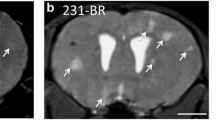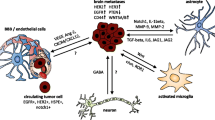Abstract
Brain metastases commonly occur in patients with breast, lung and melanoma systemic cancers. The anti-αV integrin monoclonal antibody intetumumab binds cell surface proteins important for adhesion, invasion and angiogenesis in the metastatic cascade. The objective of this study was to investigate the anti-metastatic effect of intetumumab in a hematogenous breast cancer brain metastasis model. Female nude rats received intra-carotid infusion of human brain-seeking metastatic breast cancer cells (231BR-HER2) and were randomly assigned into four groups: (1) control; (2) intetumumab mixed with cells in vitro 5 min before infusion without further treatment; (3) intetumumab intravenously 4 h before and weekly after cell infusion; (4) intetumumab intravenously weekly starting 7 days after cell infusion. Brain metastases were detected by magnetic resonance imaging (MRI) and immunohistochemistry. Comparisons were made using the Kruskal–Wallis test and Dunnett’s test. Survival times were estimated using Kaplan–Meier analysis. All control rats with brain tissue available for histology (9 of 11 rats) developed multiple brain metastases (median = 14). Intetumumab treatment either in vitro prior to cell infusion or intravenous before or after cell infusion prevented metastasis formation on MRI and decreased the number of metastases on histology (median = 2, p = 0.0055), including 30 % of animals without detectable tumors at the end of the study. The overall survival was improved by intetumumab compared to controls (median 77+ vs. 52 days, p = 0.0277). Our results suggest that breast cancer patients at risk of metastases might benefit from early intetumumab treatment.




Similar content being viewed by others
Abbreviations
- INT:
-
Intetumumab
- ECM:
-
Extracellular matrix
- VEGF:
-
Vascular endothelial growth factor
References
Palmieri D, Smith QR, Lockman PR, Bronder J, Gril B, Chambers AF, Weil RJ, Steeg PS (2006) Brain metastases of breast cancer. Breast Dis 26:139–147
Gril B, Palmieri D, Bronder JL, Herring JM, Vega-Valle E, Feigenbaum L, Liewehr DJ, Steinberg SM, Merino MJ, Rubin SD, Steeg PS (2008) Effect of lapatinib on the outgrowth of metastatic breast cancer cells to the brain. J Natl Cancer Inst 100:1092–1103
Palmieri D, Bronder JL, Herring JM, Yoneda T, Weil RJ, Stark AM, Kurek R, Vega-Valle E, Feigenbaum L, Halverson D, Vortmeyer AO, Steinberg SM, Aldape K, Steeg PS (2007) Her-2 overexpression increases the metastatic outgrowth of breast cancer cells in the brain. Cancer Res 67:4190–4198
Wu YJ, Muldoon LL, Dickey DT, Lewin SJ, Varallyay CG, Neuwelt EA (2009) Cyclophosphamide enhances human tumor growth in nude rat xenografted tumor models. Neoplasia 11:187–195
Santarelli JG, Sarkissian V, Hou LC, Veeravagu A, Tse V (2007) Molecular events of brain metastasis. Neurosurg Focus 22:E1
Desgrosellier JS, Cheresh DA (2010) Integrins in cancer: biological implications and therapeutic opportunities. Nat Rev Cancer 10:9–22
Guo W, Giancotti FG (2004) Integrin signalling during tumour progression. Nat Rev Mol Cell Biol 5:816–826
Hood JD, Cheresh DA (2002) Role of integrins in cell invasion and migration. Nat Rev Cancer 2:91–100
Lorger M, Krueger JS, O’Neal M, Staflin K, Felding-Habermann B (2009) Activation of tumor cell integrin alphavbeta3 controls angiogenesis and metastatic growth in the brain. Proc Nat Acad Sci USA 106:10666–10671
Arihiro K, Kaneko M, Fujii S, Inai K, Yokosaki Y (2000) Significance of alpha 9 beta 1 and alpha v beta 6 integrin expression in breast carcinoma. Breast Cancer 7:19–26
Bandyopadhyay A, Raghavan S (2009) Defining the role of integrin alphavbeta6 in cancer. Curr Drug Targets 10:645–652
Desgrosellier JS, Barnes LA, Shields DJ, Huang M, Lau SK, Prevost N, Tarin D, Shattil SJ, Cheresh DA (2009) An integrin alpha(v)beta(3)-c-Src oncogenic unit promotes anchorage-independence and tumor progression. Nat Med 15:1163–1169
Bauerle T, Komljenovic D, Merz M, Berger MR, Goodman SL, Semmler W (2011) Cilengitide inhibits progression of experimental breast cancer bone metastases as imaged noninvasively using VCT, MRI and DCE-MRI in a longitudinal in vivo study. Int J Cancer 128:2453–2462
Delbaldo C, Raymond E, Vera K, Hammershaimb L, Kaucic K, Lozahic S, Marty M, Faivre S (2008) Phase I and pharmacokinetic study of etaracizumab (Abegrin), a humanized monoclonal antibody against alphavbeta3 integrin receptor, in patients with advanced solid tumors. Invest New Drugs 26:35–43
Mulgrew K, Kinneer K, Yao XT, Ward BK, Damschroder MM, Walsh B, Mao SY, Gao C, Kiener PA, Coats S, Kinch MS, Tice DA (2006) Direct targeting of alphavbeta3 integrin on tumor cells with a monoclonal antibody, Abegrin. Mol Cancer Ther 5:3122–3129
Reardon DA, Nabors LB, Stupp R, Mikkelsen T (2008) Cilengitide: an integrin-targeting arginine-glycine-aspartic acid peptide with promising activity for glioblastoma multiforme. Expert Opin Investig Drugs 17:1225–1235
Mullamitha SA, Ton NC, Parker GJ, Jackson A, Julyan PJ, Roberts C, Buonaccorsi GA, Watson Y, Davies K, Cheung S, Hope L, Valle JW, Radford JA, Lawrance J, Saunders MP, Munteanu MC, Nakada MT, Nemeth JA, Davis HM, Jiao Q, Prabhakar U, Lang Z, Corringham RE, Beckman RA, Jayson GC (2007) Phase I evaluation of a fully human anti-alphav integrin monoclonal antibody (CNTO 95) in patients with advanced solid tumors. Clin Cancer Res 13:2128–2135
Trikha M, Zhou Z, Nemeth JA, Chen Q, Sharp C, Emmell E, Giles-Komar J, Nakada MT (2004) CNTO 95, a fully human monoclonal antibody that inhibits alphav integrins, has antitumor and antiangiogenic activity in vivo. Int J Cancer 110:326–335
O’Day S, Pavlick A, Loquai C, Lawson D, Gutzmer R, Richards J, Schadendorf D, Thompson JA, Gonzalez R, Trefzer U, Mohr P, Ottensmeier C, Chao D, Zhong B, de Boer CJ, Uhlar C, Marshall D, Gore ME, Lang Z, Hait W, Ho P (2011) A randomised, phase II study of intetumumab, an anti-alphav-integrin mAb, alone and with dacarbazine in stage IV melanoma. Br J Cancer 105:346–352
O’Day SJ, Pavlick AC, Albertini MR, Hamid O, Schalch H, Lang Z, Ling J, Mata M, Reddy M, Foster B (2011) Clinical and pharmacologic evaluation of two dose levels of intetumumab (CNTO 95) in patients with melanoma or angiosarcoma. Invest New Drugs. doi:10.1007/s10637-011-9639-z
Chu FM, Picus J, Fracasso PM, Dreicer R, Lang Z, Foster B (2011) A phase 1, multicenter, open-label study of the safety of two dose levels of a human monoclonal antibody to human alpha(v) integrins, intetumumab, in combination with docetaxel and prednisone in patients with castrate-resistant metastatic prostate cancer. Invest New Drugs 29:674–679
Wu YJ, Muldoon LL, Neuwelt EA (2005) The chemoprotective agent N-acetylcysteine blocks cisplatin-induced apoptosis through caspase signaling pathway. J Pharmacol Exp Ther 312:424–431
Arbab AS, Yocum GT, Wilson LB, Parwana A, Jordan EK, Kalish H, Frank JA (2004) Comparison of transfection agents in forming complexes with ferumoxides, cell labeling efficiency, and cellular viability. Mol Imaging 3:24–32
Muldoon LL, Gahramanov S, Li X, Marshall DJ, Kraemer DF, Neuwelt EA (2011) Dynamic magnetic resonance imaging assessment of vascular targeting agent effects in rat intracerebral tumor models. Neuro-Oncol 13:51–60
Chen Q, Manning CD, Millar H, McCabe FL, Ferrante C, Sharp C, Shahied-Arruda L, Doshi P, Nakada MT, Anderson GM (2008) CNTO 95, a fully human anti alphav integrin antibody, inhibits cell signaling, migration, invasion, and spontaneous metastasis of human breast cancer cells. Clin Exp Metastasis 25:139–148
Ning S, Tian J, Marshall DJ, Knox SJ (2010) Anti-{alpha}v integrin monoclonal antibody intetumumab enhances the efficacy of radiation therapy and reduces metastasis of human cancer xenografts in nude rats. Cancer Res 70:7591–7599
MacDonald TJ, Taga T, Shimada H, Tabrizi P, Zlokovic BV, Cheresh DA, Laug WE (2001) Preferential susceptibility of brain tumors to the antiangiogenic effects of an alpha(v) integrin antagonist. Neurosurgery 48:151–157
van den Hoogen C, van der Horst G, Cheung H, Buijs JT, Pelger RC, van der Pluijm G (2011) Integrin alphav expression is required for the acquisition of a metastatic stem/progenitor cell phenotype in human prostate cancer. Am J Pathol 179:2559–2568
van der Horst G, van den Hoogen C, Buijs JT, Cheung H, Bloys H, Pelger RC, Lorenzon G, Heckmann B, Feyen J, Pujuguet P, Blanque R, Clement-Lacroix P, van der Pluijm G (2011) Targeting of alpha(v)-integrins in stem/progenitor cells and supportive microenvironment impairs bone metastasis in human prostate cancer. Neoplasia 13:516–525
Li J, Tan H, Dong X, Xu Z, Shi C, Han X, Jiang H, Krissansen GW, Sun X (2007) Antisense integrin alphaV and beta3 gene therapy suppresses subcutaneously implanted hepatocellular carcinomas. Dig Liver Dis 39:557–565
Ramsay AG, Marshall JF, Hart IR (2007) Integrin trafficking and its role in cancer metastasis. Cancer Metastasis Rev 26:567–578
Mitra SK, Schlaepfer DD (2006) Integrin-regulated FAK-Src signaling in normal and cancer cells. Curr Opin Cell Biol 18:516–523
Stupack DG, Cheresh DA (2004) A Bit-role for integrins in apoptosis. Nat Cell Biol 6:388–389
Marsh D, Dickinson S, Neill GW, Marshall JF, Hart IR, Thomas GJ (2008) Alpha v beta 6 Integrin promotes the invasion of morphoeic basal cell carcinoma through stromal modulation. Cancer Res 68:3295–3303
Karadag A, Ogbureke KU, Fedarko NS, Fisher LW (2004) Bone sialoprotein, matrix metalloproteinase 2, and alpha(v)beta3 integrin in osteotropic cancer cell invasion. J Natl Cancer Inst 96:956–965
Barkan D, Kleinman H, Simmons JL, Asmussen H, Kamaraju AK, Hoenorhoff MJ, Liu ZY, Costes SV, Cho EH, Lockett S, Khanna C, Chambers AF, Green JE (2008) Inhibition of metastatic outgrowth from single dormant tumor cells by targeting the cytoskeleton. Cancer Res 68:6241–6250
Avraamides CJ, Garmy-Susini B, Varner JA (2008) Integrins in angiogenesis and lymphangiogenesis. Nat Rev Cancer 8:604–617
Stupack DG, Cheresh DA (2004) Integrins and angiogenesis. Curr Top Dev Biol 64:207–238
Eliceiri BP, Cheresh DA (2000) Role of alpha v integrins during angiogenesis. Cancer J 6(Suppl 3):S245–S249
Lockman PR, Mittapalli RK, Taskar KS, Rudraraju V, Gril B, Bohn KA, Adkins CE, Roberts A, Thorsheim HR, Gaasch JA, Huang S, Palmieri D, Steeg PS, Smith QR (2010) Heterogeneous blood-tumor barrier permeability determines drug efficacy in mouse brain metastases of breast cancer. Clin cancer Res 16:5664–5678
Acknowledgments
The authors thank Sheila Taylor, Ryan Kartheiser, Murat Oztaskin and Seth Lewin for their technical assistance. This study was supported by a sponsored research agreement from Ortho Biotech Oncology R&D, DOD center of excellence grant (Pat Steeg PI), and NIH grants: NS053468, CA137488, and NS44687 to EAN.
Conflict of Interest
This study was financially sponsored in part by Ortho Biotech Oncology R&D., the manufacturer of the intetumumab antibody. DJM is an employee and stockholder of Ortho Biotech Oncology R&D. The other authors currently have no financial interest and affiliation in this agent, its developer Ortho Biotech Oncology R&D, or its parent company Johnson & Johnson.
Author information
Authors and Affiliations
Corresponding author
Rights and permissions
About this article
Cite this article
Wu, Y.J., Muldoon, L.L., Gahramanov, S. et al. Targeting αV-integrins decreased metastasis and increased survival in a nude rat breast cancer brain metastasis model. J Neurooncol 110, 27–36 (2012). https://doi.org/10.1007/s11060-012-0942-0
Received:
Accepted:
Published:
Issue Date:
DOI: https://doi.org/10.1007/s11060-012-0942-0




